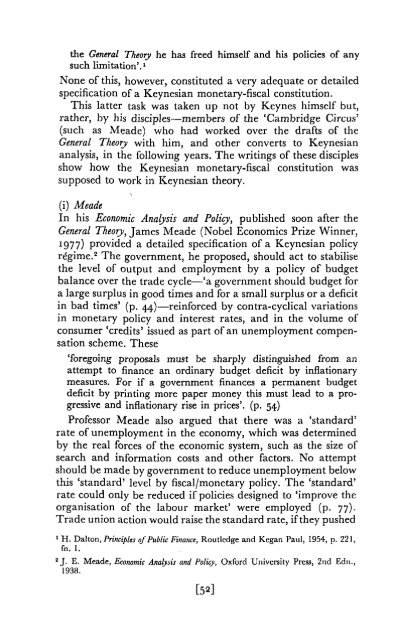THE CONSEQUENCES OF MR KEYNES.pdf - Institute of Economic ...
THE CONSEQUENCES OF MR KEYNES.pdf - Institute of Economic ...
THE CONSEQUENCES OF MR KEYNES.pdf - Institute of Economic ...
You also want an ePaper? Increase the reach of your titles
YUMPU automatically turns print PDFs into web optimized ePapers that Google loves.
the General Theory he has freed himself and his policies <strong>of</strong> any<br />
such limitation'. 1<br />
None <strong>of</strong> this, however, constituted a very adequate or detailed<br />
specification <strong>of</strong>a Keynesian monetary-fiscal constitution.<br />
This latter task was taken up not by Keynes himself but,<br />
rather, by his disciples—members <strong>of</strong> the 'Cambridge Circus'<br />
(such as Meade) who had worked over the drafts <strong>of</strong> the<br />
General Theory with him, and other converts to Keynesian<br />
analysis, in the following years. The writings <strong>of</strong> these disciples<br />
show how the Keynesian monetary-fiscal constitution was<br />
supposed to work in Keynesian theory.<br />
(i) Meade<br />
In his <strong>Economic</strong> Analysis and Policy, published soon after the<br />
General Theory, James Meade (Nobel <strong>Economic</strong>s Prize Winner,<br />
1977) provided a detailed specification <strong>of</strong>a Keynesian policy<br />
regime. 2 The government, he proposed, should act to stabilise<br />
the level <strong>of</strong> output and employment by a policy <strong>of</strong> budget<br />
balance over the trade cycle—'a government should budget for<br />
a large surplus in good times and for a small surplus or a deficit<br />
in bad times' (p. 44)—reinforced by contra-cyclical variations<br />
in monetary policy and interest rates, and in the volume <strong>of</strong><br />
consumer 'credits' issued as part <strong>of</strong> an unemployment compensation<br />
scheme. These<br />
'foregoing proposals must be sharply distinguished from an<br />
attempt to finance an ordinary budget deficit by inflationary<br />
measures. For if a government finances a permanent budget<br />
deficit by printing more paper money this must lead to a progressive<br />
and inflationary rise in prices', (p. 54)<br />
Pr<strong>of</strong>essor Meade also argued that there was a 'standard'<br />
rate <strong>of</strong> unemployment in the economy, which was determined<br />
by the real forces <strong>of</strong> the economic system, such as the size <strong>of</strong><br />
search and information costs and other factors. No attempt<br />
should be made by government to reduce unemployment below<br />
this 'standard' level by fiscal/monetary policy. The 'standard'<br />
rate could only be reduced if policies designed to 'improve the<br />
organisation <strong>of</strong> the labour market' were employed (p. 77).<br />
Trade union action would raise the standard rate, if they pushed<br />
1 H. Dalton, Principles <strong>of</strong> Public Finance, Routledge and Kegan Paul, 1954, p. 221,<br />
fn. 1.<br />
2 J. E. Meade, <strong>Economic</strong> Analysis and Policy, Oxford University Press, 2nd Edn.,<br />
1938.<br />
[52]












